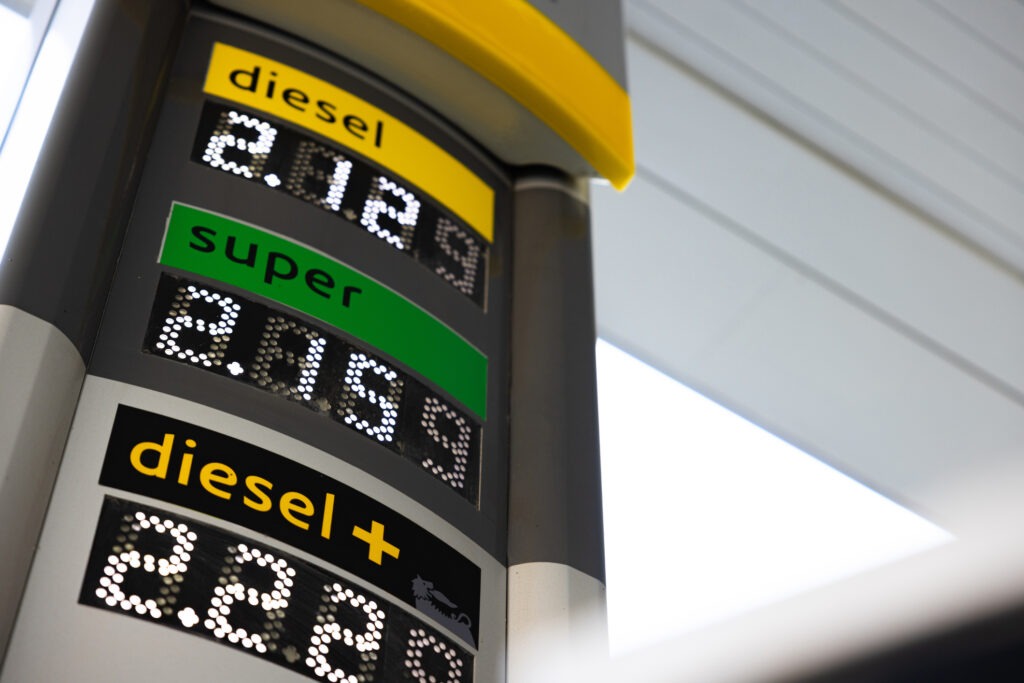Diesel remains a popular choice in Europe’s used-car markets
30 September 2022

Although sales have plummeted in Europe’s new-car markets, diesel vehicles are still a popular choice amongst used buyers. Autovista24 editor Phil Curry examines how the technology is maintaining its place in the used-car sector.
The market for new diesel cars is in decline across Europe, aided by policies that place higher taxes on the vehicles, or the issue of nitrogen oxides leading buyers to cleaner alternatives.
While the new-car market suffers, across the continent the diesel market is not as dead as it appears. Buyers still want the benefits of diesel, such as longer ranges and increased torque and engine longevity, yet they do not want to pay the premiums levied on new models. Instead, they are turning to the used-car market, creating an imbalance.
The situation is the same across most key markets in Europe. While new diesel registrations drop, the fuel type dominates used-car marketplaces. Those looking at new-car figures may surmise that diesel is a dying technology, but it is still as popular amongst private buyers as ever.
Tax rates drive used-diesel demand
In the UK, during 2021 a total of 234,526 new diesel vehicles were sold, according to the Society of Motor Manufacturers and Traders (SMMT), a 14.2% market share. This was down 27.3% on the 2020 figure. This tumble has been ongoing since the Dieselgate scandal broke in 2015, with the dominant market share of over 50% in 2014 depleting, slowly at first but dramatically in recent years.
Yet the used-car market is different. Diesel increased year-on-year sales by 9.8% in 2021, with a total of 3,046,751 transactions. According to SMMT Motorparc figures, diesel has a 37.1% share of all passenger cars on UK roads, amounting to 12,993,775 units. It is therefore clear that demand for diesel is high, but new diesel vehicles are not as desirable, if even available.
Not only has the poor reputation of diesel affected the new-car market, but so too has an increase in taxation in the UK. Before the Dieselgate scandal, diesel models were taxed favourably, based on their low CO2 emissions. As issues with air pollution and the link to the fuel became more apparent, the UK government acted to hike vehicle-excise duty (VED) rates, almost doubling the duty on some diesel models for the first annual payment, before a standard rate is paid every year thereafter.
Cars registered in the country prior to these increases keep their modest VED rates, explaining their attractiveness on the used-car market. Used diesel models are also not subject to the high first-year payment.
Jayson Whittington, chief editor – cars & leisure vehicles, at Glass’s (part of Autovista Group), highlighted that another reason for the interest in the used-car market may be the fact that most SUV models use diesel engines, the torque and performance of which are able to make up for the heavy build of the vehicles. SUVs have increased in consumer popularity over recent years, owing to their spacious interior designs and comfort. Yet the weight of the vehicle coupled to a petrol engine can reduce fuel efficiency, which is less of a problem with a diesel vehicle.
The fuel-efficiency benefit is slowly eroding in the UK, due to increased diesel prices at the pump. At present, the fuel is around 10p (11c) more expensive than petrol, so while drivers can travel further, they are now paying a premium to do so.
Reduced supply
The buoyancy in diesel transactions in the used-car market is not likely to last, although this has more to do with supply than with the technology becoming less desirable.
‘There are few signs of a slowdown in diesel demand in the used-car market, and values have broadly followed the general trend this year,’ commented Whittington. ‘The Glass’s editorial team has observed less wholesale diesel transactions this year, but that is likely more to do with less supply coming back into the market and a cooling in used-car transactions in general this year.
‘Used-diesel supply has been affected this year as lead times for new vehicles have been badly affected by component supply shortages, meaning many lease vehicles are subject to extensions. With a big uplift in battery-electric vehicle (BEV) demand due to very attractive benefit-in-kind taxation rates, lead times for the most popular BEV models are approaching 12 months, so lease contracts are being extended significantly.’
Whittington does not believe that any supply issues for diesel models will adversely affect the UK’s used-car market. ‘There is no indication that there will be a big fall in used-diesel demand but if there was, it will not cause a major problem for the used-car market as the supply of diesel cars entering retail channels has fallen sharply over the last five years due to falling registrations,’ he added.
‘I would expect supply and demand to be broadly level moving forward. Older diesels will remain in demand due to their price points and general ‘value for money’ perception. There is a concern that older diesels will fall foul to inner-city low-emission zones, but the reality is that only affects a fraction of the routes around the UK.’
French low-emission zones not a factor in choice
In France, data provided to Autovista24 by AAA Cars show that while in 2021, the new-diesel market declined 30.7%, with just 349,482 registrations, used-diesel transactions totalled 3,339,247 units, a 55.5% share of the market.
The French government has introduced a number of low-emission zones in cities across the country, meaning older diesel models are excluded from entering, while older petrol cars can still be used. This has not dissuaded buyers from the used-diesel market.
‘Right now, in terms of residual values (RVs) in the used-car market, we are on the edge of the raise, with still a very slight increase,’ comments Ludovic Percier, residual value and market analyst France at Autovista Group.
‘Even with this penalty for diesel, people living in rural areas are still preferring diesel engines as they consume less fuel. Right now, the price of diesel is, for the first time in history, higher than petrol. But if we take into consideration the fuel consumption, it is still profitable to drive a diesel outside of cities.
‘But on the new-car market it is another story. People are more likely to go to petrol cars than in the past, which is decreasing the offer on the used-car market and helping RVs to grow in the past two years, although other factors are causing long delivery delays on the new-car market.’
On the French used-car market, there is still a high demand for diesels, explaining the high price of vehicles. But customers in the new-car market have different requirements, as Percier observes: ‘Fleets brought in a large number of plug-in hybrids, but these are not as interesting to used-market customers and will most likely still be unpopular when they come back after 36 months.’
Ageing parcs play to diesel strengths
Diesel also dominates used-car sales in Italy, the country’s industry body, ANFIA, reports. While numbers tail off in the new-car market, a total of 2,641,734 used-diesel transactions were recorded last year, representing 52.1% of all used-car sales in the country.
The majority of these vehicles are between three and five-years old, while diesels older than 20 years totalled 56,568 transactions. In contrast, petrol models saw the majority of their sales in the over 20 years’ category. Diesel engines are seen as more robust than their petrol counterparts, so investing in a diesel engine early in its lifecycle means a car can be kept for longer. With petrol, the older it gets, the more likely it is to break or fail and therefore be parted with.
Diesel makes up 43.8% of Italy’s car parc, with petrol models only holding a 1.7% lead. This shows that while higher petrol sales in the market have made a difference in cancelling the domination of diesel, the desire for the fuel in the used-car market and vehicles remaining on the road for longer, means these inroads are not making a large difference in the country’s fuel-type parc.
Spain is in a similar position, with 59% of used-car sales in 2021 coming from diesel models, rising 7.2% on 2020 levels according to GAVNAM. The country has one of the oldest car-parc ages in Europe, with a lack of stock of models up to five years old due to supply issues in the new-car market blamed for keeping the average age up in the country.
Only Germany, the home of diesel, has a used-car market that is not dominated by diesel. Just 32.1% of the 6.7 million transactions in 2021 were diesels, although in the new-car market the fuel only made up 20% of registrations according to the KBA.
The green conundrum
While Dieselgate did a great deal of damage to the popularity of diesel, it can only be marked as a turning point for the fuel type. The issue of nitrogen-oxide emissions and air pollution would have been raised sooner or later, and a push for zero-emission technologies would have still seen focus shifted away from diesel development.
But diesel’s dramatic decline can also be explained in the way that new-car registrations are balanced between private and fleet or business buyers. Often the market is skewed in favour of companies rather than consumers, and this has a big effect on how new-diesel sales have performed.
The world is going through a climate emergency, with global warming and green issues at the forefront of people’s minds. Fleets therefore need to present a more environmentally-friendly image. Businesses that once invested in diesel company cars are instead looking to hybrid and electric alternatives, while rental firms offer a mixture of hybrid or petrol models to customers.
Yet private buyers do not have the need for such an image. What they do with their vehicle stays within their domain, there is no projection of a reputation to uphold. In this regard, the benefits of diesel – increased torque, better performance, and improved fuel economy – can be realised. Those who do little or no driving in cities or areas with low-emission zones will suffer no ill consequences of diesel motoring.
Therefore, diesel is likely to remain a popular choice in used-car markets for some time. In many, there is no slowdown in popularity on the horizon, although lower supply is likely. The diesel age is far from over – the emphasis has just shifted in the realms of buying habits.



